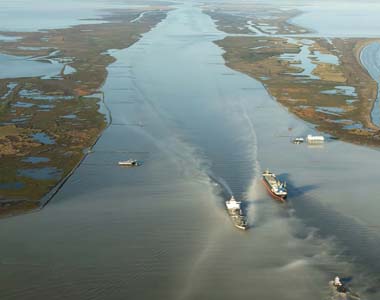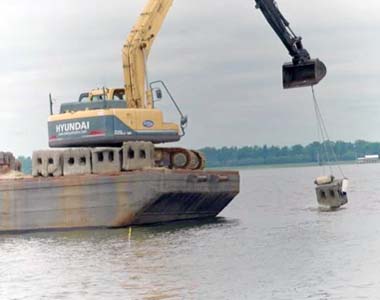 | | | In this issue of the RCC Coasts and Oceans Observer, we review climate impacts on coastal waters and marine species, efforts to reduce water pollution, and ecological restoration projects.  A recent study suggests that hurricanes are intensifying more quickly across the Atlantic, particularly in the western Atlantic. This rapid intensification fueled by climate change will place coastal ecosystems and communities under further threat. This year, a drought has allowed saltwater from the Gulf of Mexico to migrate up the Mississippi River, contaminating drinking water in multiple southeastern Louisiana towns. Lower freshwater inputs due to drought as well as sea level rise threaten fresh and brackish water ecosystems across the country. A recent study suggests that hurricanes are intensifying more quickly across the Atlantic, particularly in the western Atlantic. This rapid intensification fueled by climate change will place coastal ecosystems and communities under further threat. This year, a drought has allowed saltwater from the Gulf of Mexico to migrate up the Mississippi River, contaminating drinking water in multiple southeastern Louisiana towns. Lower freshwater inputs due to drought as well as sea level rise threaten fresh and brackish water ecosystems across the country.
Well after the end of summer, scientists and locals are still working to understand the impacts of disturbingly high water temperatures on Florida’s estuarine wildlife. In July, waters off the coast of Florida broke records, reaching over 100 degrees Fahrenheit in some locations. The additional challenges of drought, infrastructure development, and water pollution put this already fragile ecosystem under further threat. Climate change also continues to have devastating consequences far beyond our coastal waters. Ocean warming has altered whale migrations, causing them to swim into shipping lanes. Whale-ship collisions are already common but magnified by climate change. Arctic ice melt has also led to more ship collisions, specifically with North Pacific right whales, due to commercial fishing vessels traveling farther north. These whales are already endangered, consisting of just two populations, one of which being estimated at only 30 individuals.  Even in the wake of these challenges, organizations and companies are doing work to mitigate the negative environmental impacts battering the nation’s coastal and marine ecosystems. In eastern North Carolina, the state’s Coastal Conservation Association is planning to build artificial limestone reefs to attract oysters and other species and minimize erosion. Volunteers in major cities are cleaning their waterways to safeguard the ocean. In Washington, D.C., the Alliance for the Chesapeake Bay and Boating in D.C. work to clear local creeks and rivers of plastic pollution and other debris before they wash out to sea. And, in New York City, an organization called SuperDive organizes SCUBA divers to collect trash south of Queens. Even in the wake of these challenges, organizations and companies are doing work to mitigate the negative environmental impacts battering the nation’s coastal and marine ecosystems. In eastern North Carolina, the state’s Coastal Conservation Association is planning to build artificial limestone reefs to attract oysters and other species and minimize erosion. Volunteers in major cities are cleaning their waterways to safeguard the ocean. In Washington, D.C., the Alliance for the Chesapeake Bay and Boating in D.C. work to clear local creeks and rivers of plastic pollution and other debris before they wash out to sea. And, in New York City, an organization called SuperDive organizes SCUBA divers to collect trash south of Queens. Finally, in "Beyond the Blue Horizon," I explore the current state of the UN treaty to protect biodiversity beyond areas of national jurisdiction (also referred to as the "high seas treaty"). While the high seas may seem like a distant and daunting environment to most, their protection is critical to maintaining the ecosystems and industries that affect our everyday lives. As colder weather sets in, the urgent threats of climate change, pollution, and human activity on our oceans remain. It is critical to continue supporting initiatives that help protect marine life and coastal communities. | | | | | | | |  Emma Brentjens - RCC National Environment Leadership Fellow (Presidential) Emma Brentjens - RCC National Environment Leadership Fellow (Presidential)
Emma Brentjens is the co-lead of the RCC Coasts and Oceans program. She is a Master of Environmental Management student at Duke University studying Ecosystem Science and Conservation and Community-based Environmental Management. | | | | | | Beyond the Blue Horizon: What Are “The High Seas?” “But man is a part of nature, and his war against nature is inevitably a war against himself.” - Rachel Carson, 1964 Many people at some point in their lives will walk along a beach, stare out at the endless field of blue that extends beyond the horizon, and wonder what’s out there. Rachel Carson not only understood the link between humans and natural ecosystems but was able to imagine what life in the open ocean is like for sea creatures, particularly in her book Under the Sea-Wind. | | | | | | | | The Planet’s Big Blue Machine: Why the Ocean Engine Matters The ocean is an enormous engine, turning heat energy into motion, says physicist Helen Czerski. But human activity is threatening that machine — depriving the seas of oxygen, increasing stratification, and potentially changing the currents that influence global weather. Photographs of Earth taken by astronauts in space more than half a century ago revealed a blue planet dominated by oceans and billowing with clouds. | | | | | | | | College Students’ Support For New England’s Ocean Treasures Runs Deep The message is clear: students want to see Northeast Canyons and Seamounts Marine National Monument protected. In a public hearing put on by U.S. Fish and Wildlife Service (FWS) and the National Oceanic and Atmospheric Administration (NOAA), students from MASSPIRG Students provided public comments supporting the Northeast Canyons and Seamounts National Marine Monument. | | | | | | | | Vessel Strikes on Whales Are Increasing With Warming. Can the Shipping Industry Slow Down to Spare Them? Rising ocean temperatures and marine heat waves are pushing whales closer to busy shipping lanes. Flexible speed reduction areas could help prevent ship collisions, scientists say. Last March, a California giant perished. The 49-foot humpback nicknamed Fran washed up on a beach in the coastal city of Half Moon Bay. Fran had visited these waters for the entirety of her 17-year life, easily recognized by the distinctive markings and shape of her tail. | | | | | | | | An Artificial Reef is Being Built to Help Boost the Pamlico River Ecosystem. Find Out How. A New Zealand winemaker is partnering with the Coastal Conservation Association of North Carolina to build an artificial reef that will boost the Pamlico River ecosystem and help the local economy in a remote part of Eastern North Carolina, announced David Sneed, executive director of CCA NC. Earlier this year, Starborough Wine, one of 130 brands owned by E.&J. Gallo Winery, approached CCA NC about partnering on a reef project, Sneed said. | | | | | | | | The Mississippi Is Losing Its Fight With the Ocean The mouth of the Mississippi River is the arena for a kind of wrestling match. In one corner of the ring is the salt water of the Gulf of Mexico, and in the other, the river’s fresh water. The two shove against each other, and usually, the Mississippi flows with enough force to keep the salt water out. But this year’s drought, currently affecting 40 percent of the continental United States, sapped the Mississippi of water pressure, and a wedge of salt water began muscling its way upstream along the riverbed this summer. | | | | | | | | Extreme Heat Is Taking a Toll in This Florida Bay After enduring record summer ocean temperatures, anemones, sponges, and jellyfish throughout the Florida Everglades are showing signs of bleaching. Summer afternoons on Florida Bay, located off the southern tip of Florida, are a wonder. The sky, bright blue and dotted with clouds, meets the glassy water in a blur of blue that melts away any sign of the horizon. Wading birds rustle in the verdant branches of mangroves. | | | | | | | | NYC Scuba Divers On A Mission To Clean Up The Ocean On a recent Sunday afternoon, the divers arrived on a thin strip of sand at the furthest, watery edge of New York City. Air tanks strapped to their backs, they waded into the sea and descended into an environment far different from their usual terrestrial surroundings of concrete, traffic and trash-strewn sidewalks. Horseshoe crabs and other crustaceans crawl on a seabed encrusted with barnacles and colonies of coral. Spiny-finned sea robin, blackfish and wayward angelfish swim in the murky ocean tinted green by sheets of algae. | | | | | | | | We Are Trashing Our Oceans. Here’s How River Cleanups Could Help. When a plastic bag is swept down a D.C. storm drain, its final destination could be the Atlantic Ocean. After flowing into a local waterway, such as Rock Creek or the Potomac, it can wash out to the Chesapeake Bay and beyond. On a recent morning, volunteers from the Alliance for the Chesapeake Bay and Boating in D.C. worked to intercept trash at the beginning of this journey. | | | | | | | | Warming Waters of the Arctic Could Pose a Threat to Pacific Right Whales As rising global temperatures push Arctic icecaps into retreat, large and small sea creatures and the commercial fishing boats that follow them are migrating northward. This mass migration toward the relatively narrow Bering Strait could lead to more ship collisions and gear entanglements for the extremely rare and critically endangered eastern population of North Pacific right whales, according to a researcher who recently completed her Ph.D. at Duke University’s Marine Lab. | | | | | | | | Atlantic Hurricanes Intensifying Faster, More Frequently, Research Finds The list of major hurricanes that rapidly intensified before hitting the United States in recent years is long and memorable: Harvey, Irma, Maria, Michael, Laura, Ida, Ian and Idalia. All of those storms, starting in 2017, developed explosively over the Atlantic Ocean. Generally, this rapid escalation is increasingly recognized as part of a global phenomenon related to climate change and its associated warming of ocean waters — but until the past couple of years, the Atlantic’s inclusion in the trend was somewhat murkier. | | | | | | | | | | LIFE ON THE ROCKS NAMED A BEST BOOK OF THE YEAR BY THE NEW YORKER AND BOOKLIST The story of the urgent fight to save coral reefs, and why it matters to us all  Coral reefs are a microcosm of our planet: extraordinarily diverse, deeply interconnected, and full of wonders. When they're thriving, these fairy gardens hidden beneath the ocean's surface burst with color and life. They sustain bountiful ecosystems and protect vulnerable coasts. Corals themselves are evolutionary marvels that build elaborate limestone formations from their collective skeletons, broker symbiotic relationships with algae, and manufacture their own fluorescent sunblock. But corals across the planet are in the middle of an unprecedented die-off, beset by warming oceans, pollution, damage by humans, and a devastating pandemic. Coral reefs are a microcosm of our planet: extraordinarily diverse, deeply interconnected, and full of wonders. When they're thriving, these fairy gardens hidden beneath the ocean's surface burst with color and life. They sustain bountiful ecosystems and protect vulnerable coasts. Corals themselves are evolutionary marvels that build elaborate limestone formations from their collective skeletons, broker symbiotic relationships with algae, and manufacture their own fluorescent sunblock. But corals across the planet are in the middle of an unprecedented die-off, beset by warming oceans, pollution, damage by humans, and a devastating pandemic.
Juli Berwald fell in love with coral reefs as a marine biology student, entranced by their beauty and complexity. Alarmed by their peril, she traveled the world to discover how to prevent their loss. She met scientists and activists operating in emergency mode, doing everything they can think of to prevent coral reefs from disappearing forever. She was so amazed by the ingenuity of these last-ditch efforts that she joined in rescue missions, unexpected partnerships, and risky experiments, and helped rebuild reefs with rebar and zip ties. Life on the Rocks is an inspiring, lucid, meditative ode to the reefs and the undaunted scientists working to save them against almost impossible odds. As she also attempts to help her daughter in her struggle with mental illness, Berwald explores what it means to keep fighting a battle whose outcome is uncertain. She contemplates the inevitable grief of climate change and the beauty of small victories.  | | | | | |  The Rachel Carson Council Depends on Tax-deductible Gifts From Concerned Individuals Like You. Please Help If You Can. The Rachel Carson Council Depends on Tax-deductible Gifts From Concerned Individuals Like You. Please Help If You Can. | | | | | | | |  Sign Up Here to Receive the RCC E-News and Other RCC Newsletters, Information and Alerts. Sign Up Here to Receive the RCC E-News and Other RCC Newsletters, Information and Alerts. | | | | | | | | | | | |